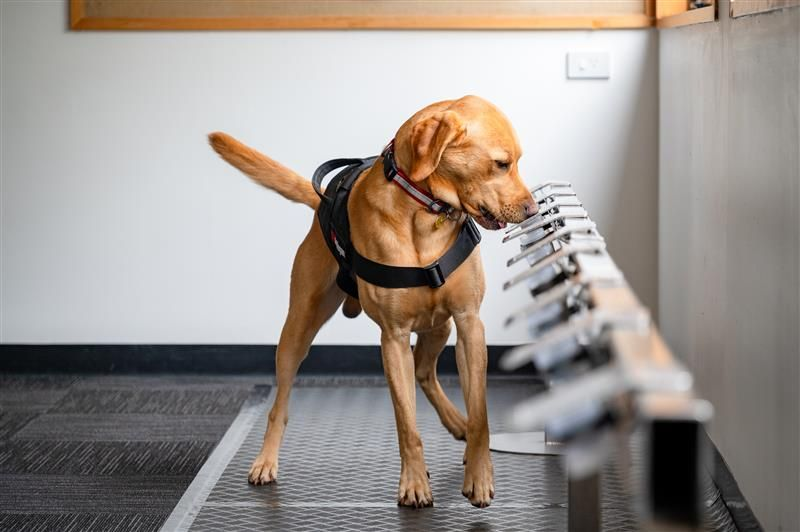Article

Royal Canin provides significant boost to progress Ovarian Cancer detection dog trials in New Zealand
Every 48 hours, one woman in New Zealand dies from ovarian cancer. But now, two remarkable dogs, Hunter and Hogan, are on a mission to change that. Trained by K9 Medical Detection (K9MD) in Dunedin, these dogs use their extraordinary sense of smell to detect cancer early – potentially saving lives.
Thanks to a $183,000NZD grant from the Royal Canin Foundation, K9MD can continue their research for an early non-invasive diagnostic test to ultimately support women throughout New Zealand, especially significant as Ovarian cancer awareness month recently held in February.
Jeremy Sassoon, Australia/NZ General Manager of Royal Canin, says “The dogs brought into the programme are selected for their superior genetic quality and intelligence. Just like professional athletes, Hogan and Hunter require premium nutrition, training, welfare and veterinarian support.”
Pet health through nutrition company Royal Canin has supported K9MD since 2022, with the Foundation also funding other science and medical research programmes involving cancer sniffing dogs across the globe.
“One of our key areas of focus is on animals supporting and having a positive impact on human health. Our rewarding partnership with K9MD allows us to continue to highlight this focus, while jointly playing a part in transformative non-invasive and early cancer detection,” says Mr Sassoon.
Pauline Blomfield, K9MD Chief Executive and founder, says the investment into expanding its Ovarian cancer trials are crucial due to New Zealand having one of the highest rates of cancer in the world.
“Every 48 hours, one woman will die from ovarian cancer in New Zealand,” says Ms Blomfield.
The new Royal Canin Foundation funding will allow K9MD to recruit more nurses across the country to collect a wider range of urine samples for the dog’s training.
The funding will also contribute to K9MD’s specialist trainers and their medical and research team.
Auckland University Dean of Science, Professor Sarah Young comment about medical science and research on this:
Like many other diseases, cancers leave specific traces, or odour signatures, in a person’s body and bodily secretions. Cancer cells, or healthy cells affected by cancer, produce and release specific odour signatures, which K9MD dogs are trained to pick up on. The K9MD dogs are capable of checking around 300 samples a week and early-stage validations show an accuracy detection rate of 96-100 per cent*.
About Royal Canin
Royal Canin is a global leader in tailored pet nutrition, offering precise and effective solutions tailored for the health and well-being of all types of dogs and cats. Royal Canin employs 500 vets and nutritionists across the company, it also manages 16 factories around the globe, one research and development centre, two innovation centres and four laboratories.
Its Foundation focuses on scientific research and innovation in New Zealand, Australia and around the world. https://www.royalcanin.com/nz
About Royal Canin Foundation
The Royal Canin Foundation is a non-profit organization supporting projects that highlight the positive role of pets in human health and welfare with three areas of focus:
· The health and welfare of the working dogs
· Pets in support of medical health
· Pets in support of human mental health
· The Royal Canin Foundation aims to create long-term value to the society and to human health; the projects that qualify to be supported cover crucial areas like disease detection, assistance dogs or therapeutic pets, in any country of the world. www.royalcaninfoundation.org
About K9 Medical Detection NZ
K9 Medical Detection NZ is a Charitable Trust dedicated to advancing medical detection capabilities through the unique and highly effective use of trained canines. The organisation’s mission is to improve health outcomes and enhance quality of life by harnessing the extraordinary olfactory abilities of dogs to detect diseases early and accurately.
It uses specially trained dogs in a controlled clinical environment to assist in the detection of cancer as an additional valuable diagnostic tool in the growing battle against cancer and other diseases.
It has achieved significant milestones for early detection of bowel and prostate ovarian cancers, with their highly trained dogs achieving between 90 - 100 per cent success rates. www.k9md.org
Like & share this page